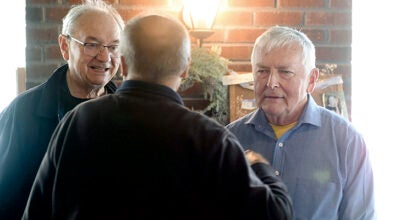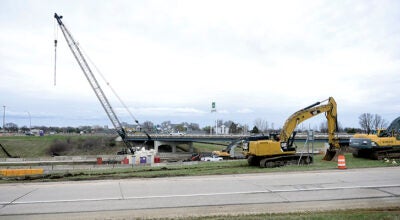Poppe: Leaders delivered during time of need
Published 10:09 am Tuesday, September 10, 2013
Disaster aid ‘on the way’ after special session
ST. PAUL — Minnesota lawmakers quickly approved $4.5 million in aid Monday for 18 counties — including Freeborn County — damaged by severe storms in late June, wrapping up a special legislative session in less than four hours.
“Disaster aid is on the way,” Gov. Mark Dayton said as he added his signature to the brief bill, which also frees up $220,000 for two counties that endured damage from an unusually bad ice storm in April.
Mower County was not listed in the bill. The 18 Minnesota counties eligible include Benton, Big Stone, Douglas, Faribault, Fillmore, Freeborn, Grant, Hennepin, Houston, McLeod, Morrison, Pope, Sibley, Stearns, Stevens, Swift, Traverse and Wilkin. Rep. Jeanne Poppe (DFL — Austin) was the chief author of the bill (HF 1) appropriating disaster relief funds.
“I’m pleased that lawmakers from both sides of the aisle worked together to continue Minnesota’s proud history providing disaster relief in a timely and bipartisan manner,” Poppe said. “Minnesotans can count on their elected officials to support them in their time of need.”
After President Barack Obama signed a federal disaster relief declaration in July, the state of Minnesota needed to appropriate the funding in order to secure matching funds from the federal government to go towards repair costs for damaged roads, bridges, buildings and other public infrastructure.
The disaster relief bill passed unanimously in the Senate and drew only a single no vote in the House from a St. Paul representative upset that Ramsey County was not among the counties to be included in the presidential disaster declaration.
“We will come together today, Republicans and Democrats, and do the right thing,” said Rep. Greg Davids, R-Preston, who represents two counties — Fillmore and Houston — that were particularly hard hit.
While there was unity on disaster relief, the special session saw more discussion about what wasn’t on the agenda than what was. Republicans used the brief gathering to harp on new sales taxes approved by the DFL-led Legislature earlier this year, repeatedly drawing parallels between the natural disaster that prompted the aid with what numerous GOP members called the “man-made disaster” of tax increases they want repealed.
Dayton and legislative leaders from both parties agreed on the limited frame for the special session, when Democrats and Republicans couldn’t agree on which of a handful of sales tax hikes should be subject to repeal votes. Dayton said Republicans never made clear how they would backfill the budget if the taxes got chopped.
The relief bill covers the state’s 25 percent share of an estimated $18 million in damage from a week of severe storms that swept through the state beginning June 20, causing widespread wind and flooding damage. The Federal Emergency Management Agency is providing the rest.
District 27A Rep. Shannon Savick praised lawmakers for working together to help the counties impacted by the storms.
“Minnesota has a long history of putting partisan politics aside when disaster strikes,” Savick said. “Our communities deserve this kind of support from the state and federal government.”
Savick was an author of the bill.
The aid money can be used to pay for debris removal, sandbagging and repair to roads, bridges, water treatment plants, golf courses and other public recreation. The 18 counties are Benton, Big Stone, Douglas, Faribault, Fillmore, Freeborn, Grant, Hennepin, Houston, McLeod, Morrison, Pope, Sibley, Stearns, Stevens, Swift, Traverse, and Wilkin.
Rep. Alice Hausman, DFL-St. Paul, cast the lone dissenting vote out of anger over Ramsey County’s exclusion. It was left out because its estimated $1.7 million in damage fell about $280,000 short of FEMA’s threshold.
Hausman said the federal formula for calculating the threshold penalized Ramsey County unfairly because it is the state’s smallest county by size but second largest by population. She also said supporting such bills is an easy way to win political support.
“To me, it’s a funny game we play with disaster relief,” Hausman said. “We pretend it’s more noble than other things we spend money on.”
While Dayton and lawmakers agreed that only the disaster bill would get a vote, rank-and-file lawmakers seized on the brief session to introduce 45 other bills. Most were to repeal various sales taxes, with both Republicans and Democrats as sponsors. There were bills to repeal authorization for a union organizing vote by some home daycare providers, a bill to approve a new statewide schools policy to crack down on bullies, and several bills related to the ongoing Minnesota Vikings stadium construction.
Among the sales tax measures most frequently targeted for repeal were new taxes on farm equipment repairs, storage and warehousing services, and on financial transactions between businesses.
“We really feel we’re missing an opportunity to take care of some of the mistakes Democrats made,” said House Minority Leader Kurt Daudt, R-Crown.
But Senate Majority Leader Tom Bakk, DFL-Cook, said those debates would have to wait until February, when lawmakers return for their next regular session. The farm-equipment repair tax in particular has proven unpopular with many Democrats, and Dayton has said he’s open to its repeal.
“To the extent there’s money available, we certainly are going to have a conversation about what we spend it on,” Bakk said. “That will be what the next session is likely going to be about.”
—The Associated Press contributed to this report.





